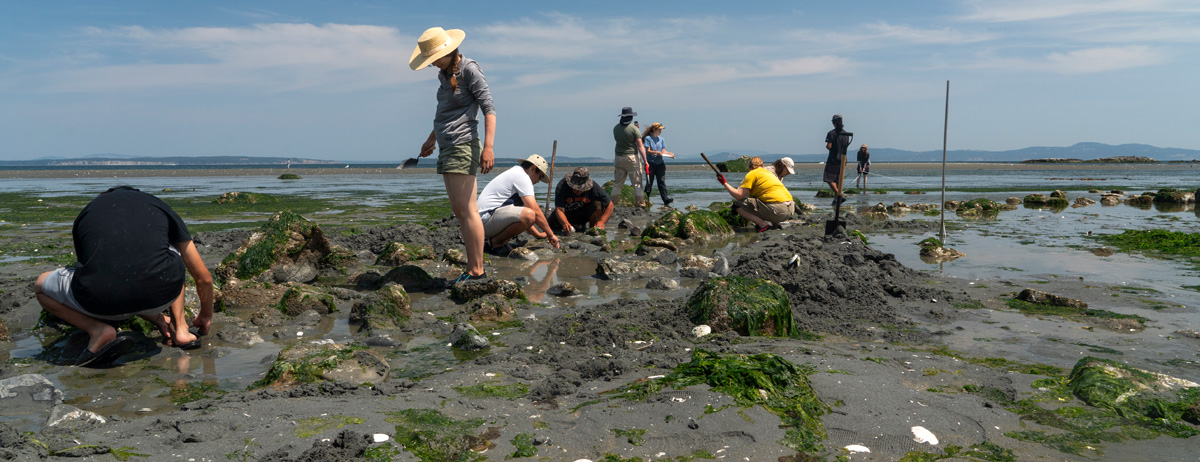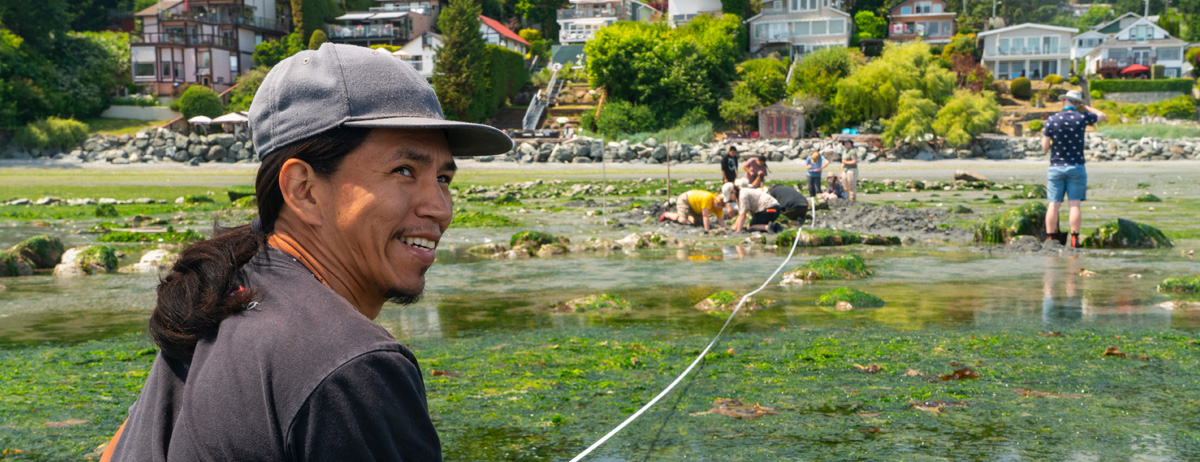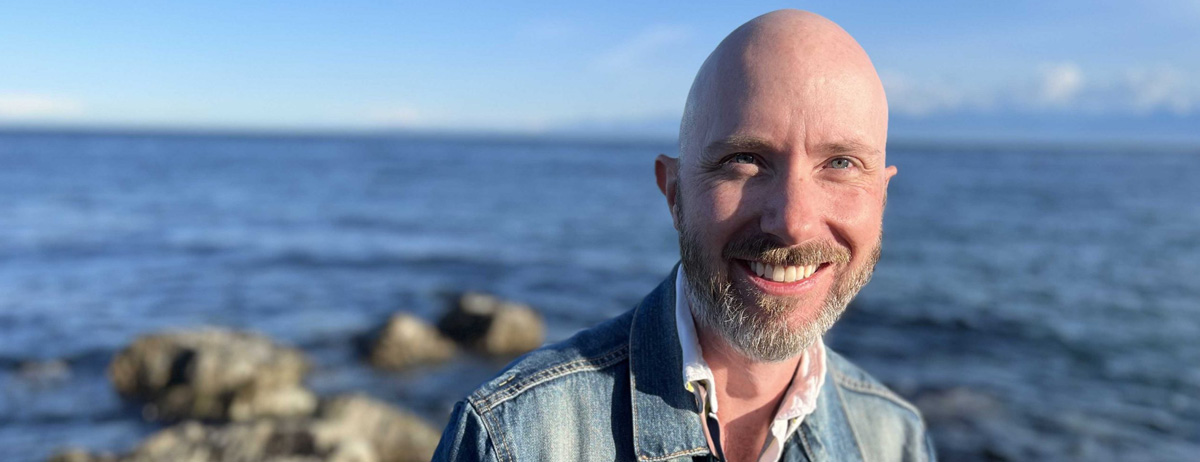Centring community at ȾEL¸IȽĆE

In July 2023, UVic undergraduate and graduate students joined members of Tsawout and W̱SÁNEĆ First Nations for a ground-breaking archaeological field school in Cordova Bay. Centred in W̱SÁNEĆ oral history and local knowledge of the ancient ȾEL¸IȽĆE village site, the UVic-Tsawout 2023 Archaeological Field School explored the spatial and temporal depth of Indigenous history in the area, and worked to inform the future of the Cordova Bay community.
W̱SÁNEĆ communities and the District of Saanich have worked over several years to set out a vision in the Cordova Bay Local Area Plan for reconnecting Indigenous peoples with their ancestral village at ȾEL ̧IȽĆE, and to raise awareness about the implications of this history for our collective futures. As part of the work, Tsawout First Nation asked us to help document what lies just beneath the surface in this place.
Brian Thom, Associate Professor in Anthropology and co-lead for the fieldschoolThe results of the archaeological work begin to emerge immediately, showing irrefutable proof of continuous and long history of Indigenous people on the lands and waters of Cordova Bay. In the intertidal zone, the team uncovered an ancient stone fish trap. At the village site, they discovered glimpses of village life – from artifacts to cooking features, and an abundance of diverse food remains from shellfish and herring to sea lion and elk, giving a glimpse into how the unique environments of the Cordova Bay area sustained people over the centuries.
“At every stage of our work, partnerships were crucial to the success of the project,” says Thom. “People at many levels of government, community and business stepped up to help the project come together.”
The Cordova Bay field school relied on the support of the District of Saanich, who provided permits and access to the waterfront public parks as sites for the digs, as well as security and site safety. Many District of Saanich staff visited the site, and recognized how their own operations could be improved to protect and honour places like this.
The provincial government stepped in too, facilitating the permits needed to execute the work, and organizing a loan agreement with the Royal BC Museum for artifacts that had been previously collected from Cordova Bay. Plus, many provincial representatives visited the site, including our local MLA, Minister of Tourism, Sport and Culture, representatives from the Ministry of Indigenous Relations and Reconciliation, and the leadership of BC’s Archaeology Branch.
Thom tapped the professional archaeology community to provide additional expertise. Principal Archaeologist from WSP, Heather Pratt, was invited to co-teach with Brian. Students benefitted from Pratt’s more than 30 years of professional fieldwork experience, paired with Thom’s expertise in community-engaged research. Dr. Colin Grier from Washington State University and Dr. Lucinda Leonard from UVic’s School of Earth and Ocean Sciences provided their unique technical expertise, using ground penetrating radar on both land and in the inter-tidal area to guide the archaeological excavations.
Knowing that local residents must be meaningfully involved, Thom partnered with the Cordova Bay Association of Community Affairs (CBACA). Together, they made sure neighbours knew about the logistics of the summer’s excavation and had an opportunity to learn about the history of the area.
Throughout the dig, students hosted an information booth and welcomed neighbours and visitors to learn about the dig and the team’s findings. These efforts helped to educate and build goodwill in the community and led to crucial financial support from generous local donors. An impressive 10% of the funding needed to do this work was provided through a community donations!

The project’s primary partners, however, were local Indigenous governments, organizations and community members. While Thom kept lək̓ʷəŋən and W̱SÁNEĆ communities apprised of the work, Tsawout First Nation played a lead partner role. Tsawout welcomed the field school to their new bighouse in the first days of the project, where Elders from Tsawout, Tsartlip, and Tseycum shared with students essential teachings on how to carry themselves in work like this, and the significance of such work. Tsawout continued to support throughout, including bringing students on field trips to explore sacred and ancestral spots in the area.
Importantly, the field school involved Indigenous community members working alongside UVic students. Thom worked with the W̱SÁNEĆ School Board and the W̱SÁNEĆ Leadership Council (WLC) to select adult and youth learners from the community to participate in the field school and the Coast Salish Employment, Education and Training Society provided work and safety gear for Indigenous participants. In addition, the WLC offered teachings from cultural monitors on cultural protocols of taking care during excavation work.
This opportunity to work with local Indigenous communities to explore their connections and history on the land was the most important aspect of the field school, says Thom. He fondly recalls one moment, in particular, when children from a SENĆOŦEN language immersion camp visited the site. “The children stood in this ancient place and sang to their Elders in their own language for the first time in over 150 years,” says Thom. “This project wasn’t about extracting artifacts—it was about bringing Indigenous culture and community back to this ancestral place.”
“The work of Indigenization and reconciliation can’t be done alone. We need to centre our research on communities’ goals if we are to make the kind of transformative change that the world needs,” he adds.
- Check out Thom’s daily updates from the field school on Facebook
- Learn more about the UVic-Tsawout 2023 Archaeological Field School at ȾEL¸IȽĆE
- Support future archaeological exploration at ȾEL¸IȽĆE
CIFAL Victoria
It is impossible to come close to achieving the United Nations Sustainability Development Goals (UN SDGs) on our own, and we don’t have time to spare. The world urgently needs us to respond to crises on multiple fronts, including climate change, biodiversity loss, and growing social and economic inequities. We all bring different skills and knowledges and we need to work together to create innovative solutions to these challenges.
Crystal Tremblay, Director, CIFAL and Assistant Professor, GeographyCIFAL Victoria, based at UVic, works with local, national and international partners to develop courses and training to help individuals, municipalities, and organizations address the UN SDGs.
Where art & science meet
When whales die, their carcasses sink deep into the ocean and new life emerges to feed on the decay. This phenomenon—called whale fall—helps scientists understand what makes an underwater ecosystem thrive. Fascinatingly, Ocean Network Canada’s (ONC) 2023 Artist-in-Residence (AIR), Neil Griffin, is also studying whale falls as a metaphor for decomposition of the written word.

The ONC AIR program is a unique internal partnership between the Faculty of Fine Arts and ONC. It strives to broaden and cross-fertilize perspectives and critical discourse on some of the most urgent issues facing society today. The program brings scientists and artists together to learn from one another and inform each others’ outputs.
As the 2023 ONC AIR, Griffin is writing a series of lyric essays exploring what emerges from decay and decomposition—both in whale falls and in literature. “I will do some science communication to help people understand ONC’s important research,” says Griffin. “But my creative work is a more central focus. I’m exploring this biological process as a metaphor for literary ideas. How does literature decompose and what emerges from decomposition instead of composition?”
As an example, the artist plans to create some erasure poetry from some of ONC’s old records of deep sea exploration. “I’m interested in what makes the flesh, blood and bones of these scientific texts and what remains when these aspects are removed,” explains Griffin.
Only a few weeks into the program, Griffin is impressed by the true partnership he’s found at the ONC. He’s working directly with ONC scientists and both disciplines are directly benefitting.
It’s the best kind of intellectual and artistic exploration. We’re building something together, and we can take what we’ve built back to our disciplines to hopefully spark new ideas and ways of approaching our work.
Neil Griffin, 2023 Artist-in-ResidenceIt's this equal partnership and mutual benefit that most excites Griffin. “If we want to tackle the major problems of the world, we need everyone contributing and working together. This residency is so exciting because it actively promotes this conversation between two very different spheres and I’m excited to see how UVic develops more partnerships like this in the years to come.”
Learn more about the 2023 ONC Artist in Residence
More stories

Scientists discover Milky Way satellite
An international team of scientists led by astronomers at the University of Victoria has discovered an ancient group of stars orbiting our own galaxy, the Milky Way. The newly discovered satellite...

UVic research gets infrastructure support
From testing environmental stresses on plants to understanding mysteries of the universe, five University of Victoria (UVic) research projects received infrastructure support from the Canada Foundation...

Bombardier partnership for sustainable aviation
UVic's Centre for Aerospace Research (CfAR) will be Bombardier's first academic partner on the sustainability-focused EcoJet Research Project.

Sustainable food chains for global well-being
Rachel Friedman, a Banting fellow, investigates policies to mitigate environmental impacts of global food chains, connecting consumer choices to sustainability.
Explore the partnering for a shared future priority